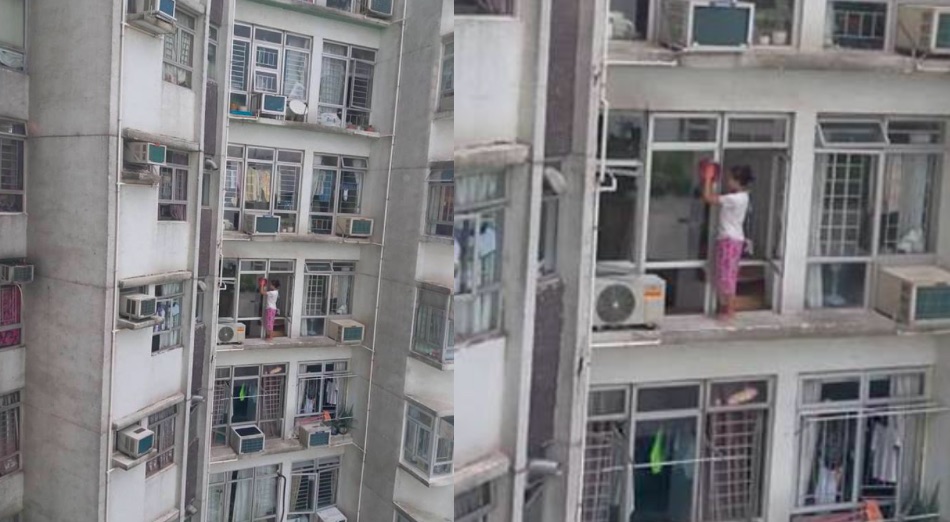No one should be forced to risk their life to clean the outside of high-rise apartment windows. You would think that’s obvious. Not only is it incredibly dangerous, it’s illegal. And yet domestic worker groups have once again been forced to call on authorities to make that message clear.
The latest call for action has come after photos of a domestic worker cleaning the windows outside of what’s estimated to be a 23rd or 24th-floor apartment went viral over the weekend.
The photos of the woman standing on the ledge of a high-rise in Kornhill Gardens in Quarry Bay were posted on Friday by Filipina domestic worker Rochen Monte, and have since been shared more than 8,000 times.
Monte — who works in the apartment block opposite — said she doesn’t know the woman personally, but that she often sees her cleaning the outside windows of the high-rise apartment, writing on Facebook that she can hardly watch when she does.
We can’t blame her. She shouldn’t have to.
In November 2016, the Labour Department introduced rules saying that that domestic workers are not allowed to clean the exterior of windows on high-rise apartments above the ground floor. That regulation came into effect after at least three domestic workers fell to their deaths while cleaning windows in 2016. Three. In one year.
The guidelines say that a Standard Employment Contract (SEC) for domestic workers must include clauses that state that they can only clean the outside of windows if it has a grill fitted over it, and that no part of the domestic worker’s body should be outside the window, apart from their arms.
However, critics have argued that the guidelines don’t go far enough to protect domestic workers.
Eman Villanueva, a spokesman from the Asian Migrants’ Coordinating Body told Coconuts HK that he was “mad, but not really surprised” when he saw the viral photos, adding that domestic workers cleaning the exterior of windows is “still quite rampant,” largely because employers who fail to observe the rules don’t face criminal prosecution.
“In the case of Singapore, they made it a criminal offense with fines and prison terms,” he said.
“[In Hong Kong] there is no penalty clause in the contract that defines the accountability, liability and penalty for those who will violate it. So there is really not much of a deterrent.”
Speaking to Ming Pao, Victor Wong, a spokesman from the Hong Kong Federation of Asian Domestic Workers’ Union (FADWU), said he was surprised that domestic workers were still cleaning the exterior of high-rise apartment windows despite the government ban.
He said this weekend’s instance in question was a breach of contract and also put the domestic worker’s life at risk, and urged authorities to do more to strengthen contractual provisions for domestic workers, and also educate them about the guidelines.
A spokesperson for the Labour Department (LD) told Coconuts HK: “If an employer requests an FDH [foreign domestic worker] to clean outward-facing windows in breach of the SEC, the FDH can refuse such request. The FDH can seek assistance from the Labour Relations Division of the LD, where free conciliation would be provided to resolve their labour disputes.”
But that’s not how it works in real life is it? Since when do domestic workers feel empowered to challenge their employers — the ones whose homes they are legally required to live in — about their duties?
The spokesperson said that the LD will be holding a workshop at the Overseas Domestic Helpers Centre in Kennedy Town on July 29 to brief domestic workers on their employment rights and benefits as well as safety issues in the home.
The spokesperson reminded people to call the police if they see a domestic worker working in unsafe conditions.




